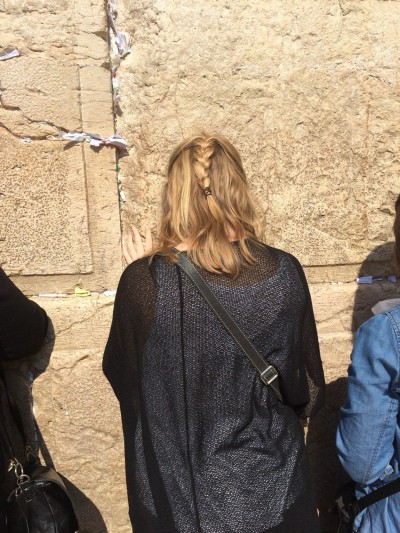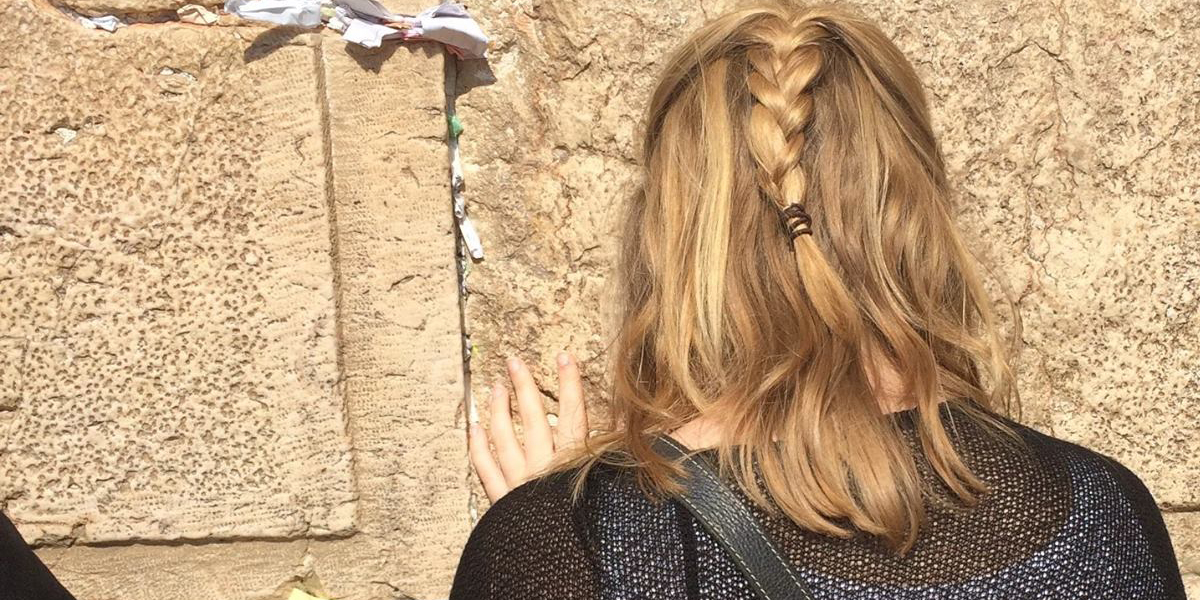
I haven’t always been scared for Israel. When the news of soldiers going into Gaza flooded our TV airwaves last year, I shrugged and then went on with my routine life, largely unaffected and unfazed. This year, when the horrific attacks and stabbings began to happen, I was immediately enraged and consumed with dread. These feelings stuck with me, not just for a minute or two but for days and weeks. I saw the headlines about Israelis being stabbed, and tears would well in my eyes. Why was I so affected? What had changed?
This summer I was taken on a 10-day trip that would affect the rest of my life. When people tell you Birthright is life-changing, they mean it. Of course, it’s “life-changing” for people in different ways. For some, it’s because they’re finally able to travel halfway across the world. For some, it’s the first time they consume their body weight in hummus and falafel. For me, it was my first time in Israel.
The moment I landed in Israel, I felt a sense of belonging, as though Israel was where all value and traditions began and grew. I clapped as we landed, even though I’d always hated those demonstrative people. Hebrew words adorned walls. Smiles and joy beamed on people’s faces as they reunited at Ben Gurion Airport. My people were everywhere.
There was a commonality between all of us. We had all come from the same place, we all had fought the same battles, in history and in modernity, and we all just wanted to exist in peace in a place we could call home. Exploring Israel helped me understand why we fought so hard for Israel to become its own state. We needed a home — and this home was beautiful.
But this nation is not just ours. It’s home to many faiths, cultures, and backgrounds as well, though Birthright often strayed from having us interact with people who weren’t Jewish.
As we drove alongside the West Bank barrier, we discussed the divide between Jews and Palestinians. My tour guide was careful with his explanations: Try not to profile and stereotype. The terrorists are radicals, and not everyone on the other side of this wall is an extremist. In every culture and religion, there are going to be those on the fringe — in ours as well.
After Birthright ended, my friends and I walked along the promenade from Tel Aviv to Jaffa. It was interesting to see certain parts of the beaches were mostly Jewish and those that were not. Along the boardwalk, we’d see Israelis immersed in a game of matkot (paddle ball). We’d walk further and the smell of food would waft in the air as Palestinians cooked on portable BBQs and blasted music. The transition was seamless; everyone lived cordially beside and amongst each other. No one was fighting then, but from this conflict, we’ve started to profile and judge. Today, could we still walk peacefully along the boardwalk without thinking that someone who is enjoying their BBQ isn’t going to attack us in the next minute? The attackers were no longer evil faceless individuals, but civilians.
Unbeknownst to me at first, Israel had become a part of me after I left. When the attacks started to occur, I felt personally victimized. When a soldier or an innocent civilian was stabbed, the only thing that separated us was that I was here and they were there. I often thought: That could have been me just a couple of months ago, walking down the street, an innocent civilian. They felt the horrific physical pain, and I felt the emotional gash. I began to realize that when one Jew was in pain, the rest of us were in pain. When one Jew cried out, the rest of us wept with them.
I didn’t come back from Israel following more mitzvot, yet I now feel inexplicably more proud to be Jewish and more tied to Israel. Do I consider myself a Zionist? Maybe, but to be honest, I had to Google the definition of Zionism. I don’t light the Shabbes candles more often than I used to. I didn’t come back shomer negiah. I still consider myself Reform in my observance. I don’t go to shul unless my father begs me for company on the high holidays. On holidays we rush through the “Jewish” part to get to the food. I don’t believe that going to shul will make me closer to HaShem, nor do I have that desire to be closer to God.
But being Jewish for me isn’t just about the spirituality, the notion of HaShem, and the extent to which you celebrate a holiday — it’s the traditions and the resilience of our people that envelops me. For me, being Jewish is about the values and traditions. It’s about having a close family, and having Shabbat dinners to come together. It’s about being a mensch in certain situations because we were raised with good values. It’s about marrying within the Jewish faith so my grandparents’ suffering during the Holocaust won’t be meaningless. The Jews have fought for so long to keep the Jewish faith alive. It is my obligation, my “Jewish guilt” that binds me to Israel and to Judaism. It is my devout pride in saying I am Jewish, and knowing Israel is there for me.
Because I know Israel is there for me, I’m scared for its future. I’m scared that this tiny country’s incredible resilience will start to fade if it continues to be attacked over and over and over again. I’m scared for the people who are just like you and me, who cannot live their lives without fearing for their lives. I’m scared that one day I will recognize the face of the next victim. I’m scared because I feel helpless.
But we’ve proven over and over that despite our small size, we are mighty with passion and resilience. This terror will prove no different.
Robin Radomski is a graduate student at Western University.

